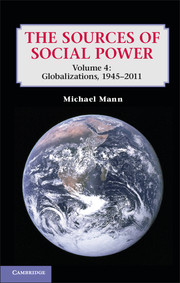Book contents
- Frontmatter
- Contents
- 1 Globalizations
- 2 The postwar global order
- 3 America in war and cold war, 1945–1970
- 4 U.S. civil rights and identity struggles
- 5 American empire during the cold war, 1945–1980
- 6 Neoliberalism, rise and faltering, 1970–2000
- 7 The fall of the Soviet alternative
- 8 The Maoist alternative reformed
- 9 A theory of revolution
- 10 American empire at the turn of the twenty-first century
- 11 Global crisis
- 12 Global crisis
- 13 Conclusion
- Bibliography
- Index
2 - The postwar global order
Published online by Cambridge University Press: 05 January 2013
- Frontmatter
- Contents
- 1 Globalizations
- 2 The postwar global order
- 3 America in war and cold war, 1945–1970
- 4 U.S. civil rights and identity struggles
- 5 American empire during the cold war, 1945–1980
- 6 Neoliberalism, rise and faltering, 1970–2000
- 7 The fall of the Soviet alternative
- 8 The Maoist alternative reformed
- 9 A theory of revolution
- 10 American empire at the turn of the twenty-first century
- 11 Global crisis
- 12 Global crisis
- 13 Conclusion
- Bibliography
- Index
Summary
World War II radically changed geopolitical power relations in the world. It delivered a mortal blow to the European and Japanese empires, which now fell either immediately or after a decade or two. The war also ensured two communist triumphs: the stabilization and expansion of the Soviet Union over Eastern Europe, and communist seizure of power in China (which I discussed in Volume 3). These two regimes now had a major ideological impact on the world; they intermittently sent military support to sympathetic regimes and movements abroad; their economies were largely autarchic, somewhat separated from most of the rest of the world. Together these war-induced changes left the United States astride most of the rest of the world. Its domination rested on two main pillars, a new and much more effective international economic order whose rules it set, and a geopolitical stability ensured by American military power and by what is called the “cold war” – though it was actually hot in Asia. I begin with the decline and fall of empires.
The end of colonialism
Though I will argue in Chapters 5 and 10 that the United States since World War II has been an empire, it has not had colonies. A case could be made that the Eastern bloc countries were colonies of the USSR, but they were unlike all others. For one thing, the USSR did not bleed the economies of these countries: quite the reverse – it subsidized them. Only Soviet rule over the three small Baltic states might be considered “colonial,” since it involved both exploitation and Russian settlers. But the other empires and colonies fell. The war delivered a swift coup de grace to the German, Italian, and Japanese empires. The devastation of Germany and Japan was such that they struggled for a decade to regain political autonomy and economic recovery. More permanent was their demilitarization, which became accepted as desirable by most of their peoples. Germany and Japan became great economic powers but without wielding military muscle. For them, soft replaced hard geopolitics.
- Type
- Chapter
- Information
- The Sources of Social Power , pp. 13 - 36Publisher: Cambridge University PressPrint publication year: 2012



